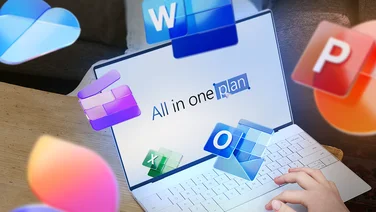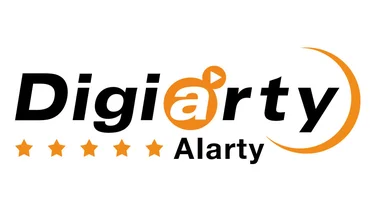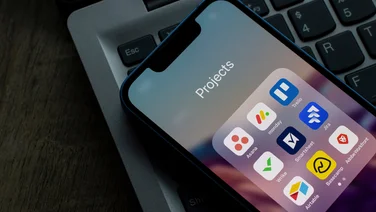To help us provide you with free impartial advice, we may earn a commission if you buy through links on our site. Learn more

Telephone switchboards and operators may be a thing of the past, but business callers still need to reach the right person, extension or department. These days, they’re connected by internet-based technology called PABX. But what exactly is PABX?
PABX is short for private automatic branch exchange. It’s the automated equivalent of the old manual PBX system, which saw rooms of operators racing to plug copper wires into ports when connecting business callers. These days, PABX does the connecting automatically, and instantly. Most PABX systems are cloud-hosted, so businesses don’t even need hardware to use it, let alone a room full of switchboard operators.
With business budgets under pressure, how much does all this sophisticated functionality cost? Much less than a traditional business phone system. Providers such as 8×8 and RingCentral offer hosted VoIP-based PABX packages for under £10 per user, per month. Even their most advanced plans, with unlimited storage and unlimited international business calling, come in at under £30 per user, per month.
Below, we’ll explain what PABX does and how it works with VoIP to run all of your phone needs through the internet. Then we’ll discover the current best PABX deals for your business.
Get a free VoIP quote today
Take our quick survey below and we’ll provide a free quote for a telephone system that matches your requirements.
What is PABX, and what does it do?
Why does my business need PABX?
The UK’s landline network will be switched off in 2025, taking analogue switchboards and ISDN with it. If your business hasn’t yet found its ideal IP-based phone system, now’s the time to choose.
Internet-based phone technology such as VoIP (voice-over internet protocol) and PABX are now business essentials, vital for enabling your customers and clients to reach you. The terms are sometimes used interchangeably, and they very often work together in the same business telephone system; but they’re not the same thing. VoIP is the technology that takes care of the voice (or video, or message) data transmission, while PABX manages the connections.
As you’d expect from a good telephone operator, PABX can also log messages, forward calls and juggle hold queues. The best PABX systems can even act as a fully featured communications platform, with CRM integrations and custom interactions to help your staff and delight your customers.

READ NEXT: What is VoIP?
What’s the difference between a VoIP, PABX and PBX system?
The history of business telephone systems is an acronym soup. Before we drown, let’s spoon out the chief suspects and reveal what they mean.
- PABX – This is the technology that connects callers to your organisation’s internal network and provides business features such as call forwarding. In hosted PABX systems, all data and software is stored in the cloud and runs via the internet, so there’s no need for wires and landlines.
- PBX – Private branch exchange. Strictly speaking, PBX is the old, pre-automated system of switchboard operators (there’s no “A” for automatic); but the old system is now effectively retired, so the acronyms are basically interchangeable.
- IP PABX – Internet (IP) based automation. Non-IP-based PABX is all but unavailable now, so most modern PABX systems are IP PABX. And by IP, we mean IP-based phone calls, so IP PABX is effectively the same thing as…
- VoIP PABX – VoIP (voice-over internet protocol) is the technology for making phone calls over the internet. All of today’s PABX plans enable businesses to use VoIP, so “PABX plans” and “VoIP plans” are generally one and the same thing.
Why is a PABX telephone system good for my business?
The main benefit of switching to a VoIP-based hosted PABX telephone system is the cut in costs to your business. The analogue network was a hugely expensive part of running an organisation. Not only did you have to pay landline prices (even when people inside your company wanted to call each other), but the cost of installing multiple phone lines was significant.
With cloud-hosted VoIP and PABX, you no longer need a switchboard of any kind, because all call data is handled by the provider. You don’t need special handsets or headsets either, because most PABX systems work using mobile apps. This lack of hardware is part of what makes a PABX system infinitely scalable, allowing your communication system to grow with your business – and it’s ideal for keeping a remote workforce in touch with each other.
PABX is also extremely efficient. Call response times are much faster than with a manned or electronic switchboard, delivering a better experience for your customers, who are more likely to return as a result. You also get to customise features such as your hold music and voice responses, giving you a great opportunity to personalise your brand and engage with your customers and clients.
What business features are included with a PABX system?
The best PABX plans include all the features you’d want from a business telephone system, such as call transfer, call waiting, automatic call forwarding, and even a virtual receptionist. Many also surpass traditional phone systems by adding the kind of customisable features and workflow integrations you would expect from a CRM. Here are a few to look out for.
- Customisable call transfer and forwarding – The best PABX plans let you customise a pre-recorded virtual receptionist to give your callers as personal an experience as possible. Functions offered include recognising spoken replies and rerouting calls, perhaps using a custom dial-by-extension directory of people and departments.
- IVR (interactive voice response) – These are the pre-recorded voices and automated messages that greet your callers and offer options such as which number to press for which function. Ideally, you’ll customise this message to give your customers a better, more on-brand experience. RingCentral MVP has a particularly good drag-and-drop tool for creating and customising your organisation’s IVR.
- Flexible device support – Cloud-based PABX systems let you connect to colleagues from any device, anywhere in the world. This delivers so much more flexibility and time-efficiency than in the early days of VoIP, when remote colleagues struggled to install software such as Skype on their computers.
- Call recording and screening – These are the types of function that any advanced PABX system will now include, but which were unimaginable back in the days of electronic switchboards.
- Monitoring and analytics – Call monitoring won’t make everyone comfortable, but it does offer valuable business benefits such as highlighting Monday-morning customer service bottlenecks.
- Voicemail to text or email – Voicemail functions are standard with any PABX plan, but the best include added extras such as the option to have voice messages emailed to you as instantly accessible MP3 files, or even transcribed automatically.
What else should I consider when choosing a PABX provider?
If you’re just starting out, a fully hosted VoIP-based PABX phone system that lets you run all calls and other communication functions through mobile apps will be all you need. But if you’re a more established business, you’ll need to make sure that your PABX plan and provider integrate well with your existing communications infrastructure.
Here are a few things to consider…
- Workflow integrations – Your PABX plan should include integration with the communication tools and CRM platforms that your business is already committed to, such as Zoho, Salesforce or Slack. Discuss these requirements with your shortlisted providers before signing up, and use a free trial to test the integrations if you can.
- Equipment compatibility – If you have an existing phone system then it’s worth checking whether the equipment will support your desired provider and package.
- Customer support – Does your chosen PABX provider offer support during setup or if you run into trouble, and is it easy to access 24/7?
- Number of users – If several people on your team will need to make calls simultaneously, make sure your provider and package can support it. Most hosted PABX providers offer unlimited VoIP “lines” for inbound and outbound phone calls, but they can’t all handle multiple simultaneous calls as capably as you may need, so make sure the plan is designed to support multiple users.
- Setup and support – Most hosted PABX systems are very easy to set up, and support should be available 24/7. With medium- and higher-level plans, you may need to speak to someone at the provider when setting up rather than just diving straight in, but this does at least give you a chance to discuss your particular needs.
- Call types – All VoIP-based PABX plans include voice calls, as you’d hope, but there’s usually far more besides, including internet fax, chat and conference calls as well as video.
- Bundled calls – Many cheaper PABX plans include a certain number of minutes for free, usually 100, before you have to pay. If your volume of calls is high, it will make more financial sense to pay for a higher plan that includes lots more minutes, as well as international calls.
What is the best PABX plan for my business?
All these plans include VoIP calling and hosted IP-based PABX:
8×8 is named “best phone system for a growing business” in our roundup of the best business telephone systems. The £10 per user, per month Express plan is a great choice for small businesses with up to five users, with basic auto-attendant, voicemail, team messaging and videoconferencing. The X2 tier (£19 per user, per month) gives you unlimited users, advanced telephony features such as presence detection and document sharing, unlimited voice calls to 14 countries, and an impressive range of integrations that includes Salesforce, Slack and Zoho. Top tier, X4 (£47 per user, per month), adds advanced call handling and supervisor analytics.
Yay.com is the best-value VoIP-based PABX provider you’ll find. At less than £6 per user, per month its Starting Out plan offers amazing value with voicemail, hold music and 100 minutes of calls that you can make through your browser, mobile app or compatible desk phone. The Flying High plan (£16.79 per user, per month) adds more bundled minutes plus video calling, IVR menus, voicemail transcription and integration with tools including Zoho, HubSpot, Microsoft and Google.
RingCentral is a great choice for ambitious startups. Its Essentials plan (£8 per user, per month) offers voicemail, messaging, 100 bundled minutes, call logs and apps. Standard (£15 per user, per month) adds a superb virtual receptionist plus automatic call recording, advanced call handling, unlimited audioconferencing, HD video meetings and lots of platform integrations, while Premium (£20 per user, per month) adds voicemail transcription, analytics and CRM integrations.






